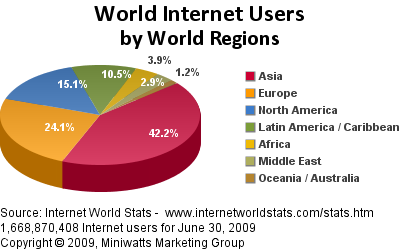 The number of Internet users has more than doubled since the year 2000, and in 2007 there were over 1.1 billion people online worldwide. Web services have shaped youth cultures since mid 1990s, instant communication tools have introduced real time communication culture to masses. Web has also changed the way of working.
The number of Internet users has more than doubled since the year 2000, and in 2007 there were over 1.1 billion people online worldwide. Web services have shaped youth cultures since mid 1990s, instant communication tools have introduced real time communication culture to masses. Web has also changed the way of working.New web2.0 companies and web service developers bring forward new services and solutions to be distributed potentially to the "whole world" at once.
Even though the Internet is as common as television and newspaper in many families, still ~80% of world population do not have internet access (or newspaper or television). The estimated number of Internet users in the world for March 31, 2008 is 1 407 724 920 and the penetration is 21.1%, based on the world population estimate of 6 676 120 288 persons for mid-year 2008.
I am currently writing an article together with Dr. Outi Cavén-Pöysä on online youth cultures. More closely we will focus on motivation factors, trust and attitudes towards social networking.
The article will be based on quantitative data from Japan, South Korea and Finland (2006-2007). We decided to focus on these three pioneer countries of the 1990s because at the end of 1990s SMS culture in Finland, iMode craze in Japan and online multiplayer gaming culture in South Korea were something different and never before seen. The article will study if these countries have special qualities to generate novel kind of internet cultures in future as well or would innovations develop anywhere regardless of the history?
According to Paul Budde Communications the Internet is growing at a good rate, but the growth rate is not the same all over the world. The growth rate will not increase until broadband is further developed, and its price rates reduced. Will the Internet penetration have an effect on user innovations or the development of novel web cultures? How much does grass roots innovation, chance and cultural issues have to do with the development? Most likely we will not be able to offer answers to all of those question but I thought of sharing them with you anyhow.



No comments:
Post a Comment